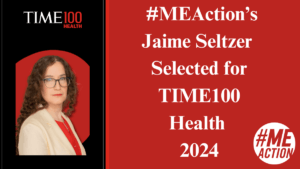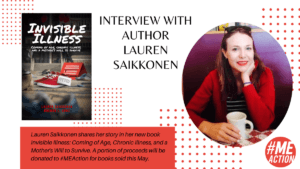As the U.K. prepares to review its national clinical guidelines for ME, it is high-time that the National Institute for Health and Care Excellence (NICE) listens to the evidence showing that Graded Exercise Therapy (GET) is harming people with Myalgic Encephalomyelitis.
Listen to the words of the words of the director of the National Institute of Neurological Disorders and Stroke (NINDS) in the U.S. as he describes the effect of exercise on people ME:
“In ME/CFS, people become incredibly disabled after exercise. It’s not like you and I; we exercise and we’re beat and the next day we wake up and we’re fine with a few aches and pains. Folks [with ME/CFS] will be wrecked for weeks,” said Walter J. Koroshetz, M.D., director of NINDS, in a recent interview on the White House Chronicle.
NICE has an opportunity to play a major role in improving quality of life for people with ME, but only if it ends the squandering of precious resources currently focused on Graded Exercise Therapy (GET) and Cognitive Behavioural Therapy (CBT) and as a pathway to healing for ME patients.
Recommending that people with ME undergo graded exercise – as the NICE guidelines currently prescribes – is downright negligent given the sustained reports of harm from people with ME who have followed this protocol. Patients are committing to treatments recommended by NICE in good faith, yet find their condition has worsened significantly.
In part two of this report, Jennie Spotila presents the research showing how exercise causes post-exertional malaise (a severe worsening of symptoms following exertion) in people with ME, and the differences in the physiological responses of people with ME to exercise as compared to healthy controls.
Talking therapy can help people cope with any illness, but you wouldn’t tell a cancer patient or someone with MS to work on their thought process, and then send them away empty-handed.
“It’s pretty clear that the patients who are suffering from this illness are severely disabled,” Dr. Koroshetz went on to say in the interview. “They have a host of biological abnormalities. Yes, this disease has a biological basis. We don’t know what the unifying biology is behind the disease; it’s a big mystery out there to be uncovered,”
ME still lacks a single diagnostic biomarker, and few treatment options (some treatments, such as antivirals, help some patients while do nothing for others). People with ME are forced to experiment on themselves in desperation. Major biomedical investigation needs to begin now to push the science forward in a great leap.
Shamefully, it is the US government (via the National Institutes of Health) that is funding the largest research grant in the U.K of £1.57 million to continue a longitudinal study measuring changes in the immune system and genetic profile of people with ME/CFS.
It is high time that the UK Research Councils starts a serious investigation into the complex biological mechanisms that cause ME, and stop sweeping the estimated 250,000 British people with ME aside with a pat on the head and this foolish “chin up” masquerade.





